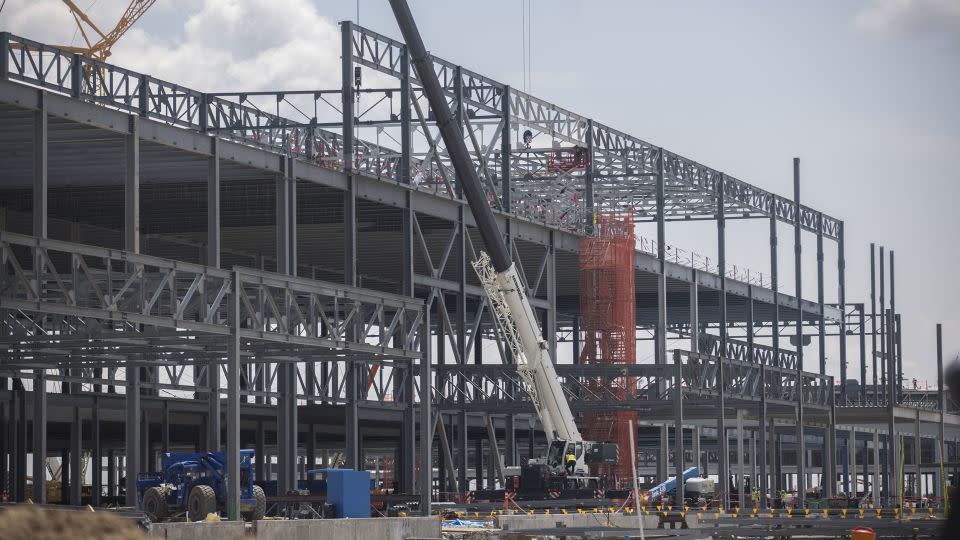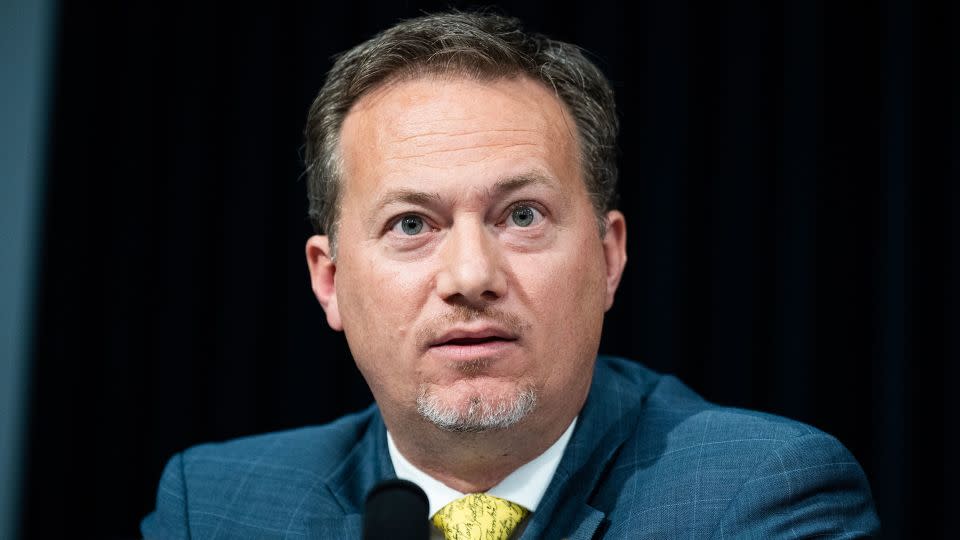The biggest winners of Biden’s green climate policies? Republicans.
When President Joe Biden’s massive climate bill passed Congress in 2022, Republican Rep. Richard Hudson of North Carolina complained it was boondoggle.
The Inflation Reduction Act, which contained the largest climate investment in US history, would “throw money at woke climate and social programs that won’t work — including over $350 billion for ‘Green New Deal’ initiatives,” Hudson said in a statement after IRA’s passage.
But Hudson – now the head of House Republicans’ campaign committee – is one of the members of Congress whose district has benefitted the most from the climate law and its massive investment in clean energy.
About $12.7 billion in private investment has been announced in Hudson’s district since the bill passed, the second-highest amount in the nation. Much of it is from Toyota expanding a gargantuan car battery plant that has tripled in size since it was first announced. The factory will span the length of 756 football fields and will spur 5,100 new jobs, the company estimates.
Hudson isn’t alone. House Republicans uniformly voted against the IRA in August 2022 and have voted to repeal some of its biggest programs dozens of times, but their districts are disproportionately reaping its benefits.
The vast majority of the $346-billion-worth of announced investments – nearly 78% – has gone to Republican congressional districts, according to a CNN analysis of data from the nonpartisan Rhodium Group and the Massachusetts Institute of Technology.
“It’s much more Republican-skewed at the congressional district level than at the state level,” Trevor Houser, partner at Rhodium, told CNN.
In a green twist of irony, the deluge of cash into red districts could actually save the climate law from total repeal if Republicans and former President Donald Trump win later this year.
Hudson was measured in his criticism when CNN asked him if he would vote to fully repeal the climate law if Republicans win control. He told CNN he wasn’t aware of the specific numbers in his district, and said that instead of seeking a full repeal, he would seek targeted changes.
“I think the experience with the [Affordable Care Act] tells us that rather than try to repeal one big bill with another big bill, we ought to look at the individual policies and the ones that we think are hurting American people,” Hudson told CNN.
Republican districts are awash in climate investment
In states including Georgia, Arizona and Texas, House Republicans are seeing a deluge of cash and jobs flowing into their districts as companies use clean energy tax credits to construct factories to build EVs and their batteries, and as massive wind, solar, hydrogen and sustainable aviation fuel projects come online.
In Georgia’s 11th district, Rep. Barry Loudermilk has touted the construction of a massive EV battery factory by Hyundai and SK Battery America, which is projected to create more than 3,500 jobs. The factory comprises nearly 70% of the $7.4 billion that has flowed into his district.
“It’s an unbelievable advancement, the new battery plant is just unbelievably large,” said Loudermilk.
Nationwide, about $268 billion in announced investments has gone to Republican-held districts, compared with about $77 billion going to Democratic districts.
Democratic Rep. Troy Carter of Louisiana has around $13.2 billion flowing into his district – the most in the nation. Carter’s district, which snakes from Baton Rouge to New Orleans, is benefiting from several companies investing in hydrogen, sustainable aviation fuel and carbon capture – industries related to Louisiana’s proximity to oil and gas.
“Louisiana, once solely reliant on oil and gas extraction, has the workers and infrastructure to lead the nation in the green energy transition which will lead to good-paying careers at home,” Carter said in a statement, adding his state is “benefitting greatly” both from private and public investment from the law.
Republican districts round out the top five with the largest sums in private investment. Hudson comes in at number two, and the remaining three of the top five districts are in Texas: Reps. Michael Cloud, August Pfluger and Randy Weber.
The big projects in each Texas district run the gamut from Tesla’s massive lithium refinery being constructed in Cloud’s south Texas district, dozens of wind, solar and battery storage projects, and sustainable aviation fuel and hydrogen facilities.
The reason so much private money has flowed to Republican districts is simple, according to Rhodium’s Houser: They have more land.

“Republican districts tend to be more rural,” Houser said. “It’s very hard to build large industrial facilities in dense urban areas.” Comparatively, Rhodium and MIT’s data shows that retail sales of EVs and rooftop solar panels are stronger in Democratic districts (heat pumps are more popular in red districts due to their prolific use in the South).
In addition, Republican states have laxer labor laws and several states, including Georgia, have put together enticing state tax packages to lure big companies.
“That’s where the pro-business policies are,” Loudermilk said. “They’re going to areas that are welcome for growth and have limited obsessive regulation.”
Why Republicans may not kill the climate law after all
The cash advantage in GOP districts may ultimately protect Biden’s climate law, even if Republicans sweep the election.
“I think the odds of complete repeal, even in the Republican trifecta, are very low,” Houser said.
House Republicans have tried to repeal big pieces of the IRA several times, including voting to cut billions in tax subsidies. Those attempts haven’t gone anywhere in the Democratically controlled Senate.
“We’re seeing a number of elected officials who decided they would vote against the IRA, and now they’re seeing the benefits delivering for their constituents, they are celebrating those benefits,” White House deputy chief of staff Natalie Quillian told CNN. “Because who wouldn’t celebrate more jobs, billions of dollars in investments in your community?”
Quillian said the White House takes the threat of repealing Biden’s climate bill “very seriously.”
“We take them at their word that they want to repeal this,” Quillian said. “Our job is to make sure that these investments land and then they stick.”
Despite their party’s repeal attempts, some Republicans are working closely with clean energy companies in their districts to ensure new factories and jobs stick around for the long haul.
“We are very well taken care of by our representatives in the Georgia government, and by our local representatives,” said Scott Moskowitz, the head of public affairs and market strategy at QCells North America, which is building a $2 billion solar panel manufacturing facility in Loudermilk’s district. “Congressman Loudermilk has been vocally supportive of what we’re doing and he recognizes it’s going to take a lot of tools for these critical industries to succeed longterm.”
Several House Republicans CNN interviewed didn’t commit to backing a full repeal, but said they wanted to pare back elements of the law. For instance, Cloud, the Texas Republican whose district has seen nearly $9.8 billion announced investment, said he wants to put caps on the law’s clean energy tax credits, because the federal price tag has ballooned well beyond original estimates due to their popularity with businesses and consumers.

“Even the authors of the bill have said, that was kind of an oversight not to put a cap on,” Cloud said, adding that IRA’s vast subsidies are “distorting the economy.”
“I have talked to companies that have actually changed their business model to go after it,” Cloud said.
Loudermilk, the Georgia Republican, told CNN he’s intent on repealing parts of the IRA, concerned the law is “trying to force a technology before it’s mature enough.”
Some companies, aware of potentially shifting political winds, told CNN they’re making investment decisions in clean energy based on broader market demand.
“Incentives can be helpful but are often temporary or subject to changing political dynamics,” Susan Elkington, Toyota’s senior vice president of electric vehicle supply, told CNN in an emailed statement.
Rep. John Curtis, a Republican from Utah and founder of the Conservative Climate Caucus, said that even though the GOP opposed the partisan reconciliation process used to pass the IRA, the bill contains many things that Republicans like.
“It’s a bit of a false narrative that you’re 100% in or 100% out on the IRA,” Curtis said. “I do think it’s a legitimate point that as these investments come into Republican districts, that makes it easier for Republicans to not necessarily support but see the impact of those.”
Curtis, who is running for US Senate in Utah, said he thinks if Republicans take control in 2025, they’d pursue more limited rollbacks to the law, rather than full-scale repeal.
Bob Keefe, executive director of clean energy group E2, said the law is already transformative for state and local economies.
“Those opportunities would not exist without the IRA, regardless of what opponents of the IRA would say about it,” Keefe said. “It just wouldn’t have happened. This is how you rebuild an economy.”
About this analysis: There are several data sets that track IRA investments in congressional districts, all of which differ slightly. CNN went with Rhodium and MIT data because it only includes projects that have at least entered final engineering and design or final site selection. It excludes projects where companies made initial announcements but then backed out of projects. This choice results in a higher likelihood the projects in our analysis will get built.
CNN’s Lauren Fox contributed to this report.
For more CNN news and newsletters create an account at CNN.com


